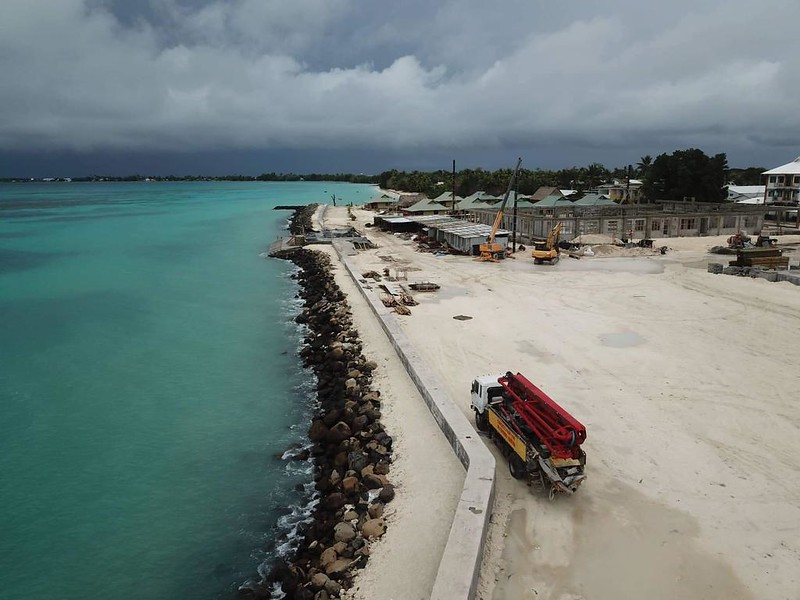“Protecting the global commons of the oceans and atmosphere is a matter of life and death,” said one expert who praised the decision.
By Jessica Corbett. Published 5-21-2024 by Common Dreams

An international tribunal on Tuesday delivered a decision that green groups and leaders of small island nations celebrated as a “groundbreaking victory for ocean and climate protection.”
The International Tribunal for the Law of the Sea (ITLOS) announced in an advisory opinion that greenhouse gas emissions are marine pollution under the United Nations Convention on the Law of the Sea and parties to the treaty “have the specific obligation to adopt laws and regulations to prevent, reduce, and control” them.
The advisory came in response to a December 2022 submission by the Commission of Small Island States on Climate Change and International Law (COSIS), which includes Antigua and Barbuda, the Bahamas, Niue, Palau, St. Kitts and Nevis, St. Lucia, St. Vincent and Grenadines, Tuvalu, and Vanuatu.
“The tribunal’s opinion is an historic legal victory for small island nations, demonstrating their global leadership on this crucial issue for the future of humankind,” said Payam Akhavan, a COSIS legal representative to ITLOS. “It is a manifest injustice that they make negligible contributions to the problem, but suffer the worst effects of rising sea levels and extreme weather events that have brought some to the brink of extinction.”
“As the guardian of the ocean treaty, ITLOS has taken the critical first step in recognizing that what small island nations have been fighting for at the COP negotiations for decades is already part of international law,” he continued, referring to United Nations climate summits. “The major polluters must prevent catastrophic harm to small island nations, and if they fail to do so, they must compensate for the loss and damages.”
COSIS was initiated at COP26 by Tuvalu along with Antigua and Barbuda, whose prime minister, Gaston Browne, welcomed the ITLOS decision, stressing that “small island states are fighting for their survival” and “some will become inhabitable soon because of the failure to mitigate greenhouse emissions.”
Eselealofa Apinelu, Tuvalu’s high commissioner to Fiji, pointed out that the advisory opinion “spells out the legally binding obligations of all states to protect the marine environment; to protect against the existential threats posed by climate change.”
Center for International Environmental Law (CIEL) Climate & Energy Program director Nikki Reisch noted Tuesday that “to those that would hide behind the weaknesses of international climate treaties, this opinion makes clear that compliance with the Paris agreement alone is not enough.”
“Pledges and promises at annual climate conferences do not satisfy states’ legal duties to take all necessary measures to prevent, reduce, and control the greenhouse gas emissions polluting the marine environment, in line with climate science and the goal of limiting warming to 1.5°C,” Reisch continued.
“We know that doing so requires rapidly phasing out all fossil fuels. States that fail to comply face legal responsibility,” she added. “Protecting the global commons of the oceans and atmosphere is a matter of life and death—not just for entire marine ecosystems and the coastal and island communities most directly dependent on them and at greatest risk from climate change, but for all of humanity and the planet as a whole.”
A historic precedent set today – @ITLOS_TIDM concluded that greenhouse gas emissions are a form of marine pollution.
— Oil Change International (@PriceofOil) May 21, 2024
Major polluters can be held accountable to preventing catastrophic harm to small island nations, and if they don't, they must compensate for loss & damages. https://t.co/sBZaToTnd9
CIEL and Greenpeace International last year had formally urged ITLOS to reach the conclusion that the tribunal ultimately did.
Louise Fournier, legal counsel for climate justice and liability at Greenpeace, also cheered the outcome, saying Tuesday that “the ITLOS advisory opinion marks a significant step forward in international environmental law and the protection of our oceans.”
“It sets a clear legal precedent for addressing climate change through existing international frameworks and reinforces states’ responsibilities to act on climate change,” Fournier said. “Oceans are the world’s largest carbon sink. Our oceans provide us with food, livelihoods, culture, and half of the oxygen in the atmosphere; they are vital in the fight against the climate crisis, and in maintaining all life on the planet. ITLOS confirmed it unanimously: Climate change is an existential threat to human rights.”
As Reuters reported:
But the road to concerted global action is far from smooth.
China, the world’s biggest carbon polluter, had argued in court that the tribunal did not have general authority to issue advisory opinions, saying these could fragment international law. China’s foreign ministry was not immediately available for comment.
Additional forthcoming legal opinions could further complicate matters, as the international community prepares for COP29.
“This is the first of three advisory opinions international tribunals have been asked to provide to clarify what legal obligations states have to combat climate change,” Euronews explained. “Opinions are also expected from the Inter-American Court of Human Rights and the International Court of Justice.”
This work is licensed under Creative Commons (CC BY-NC-ND 3.0)

